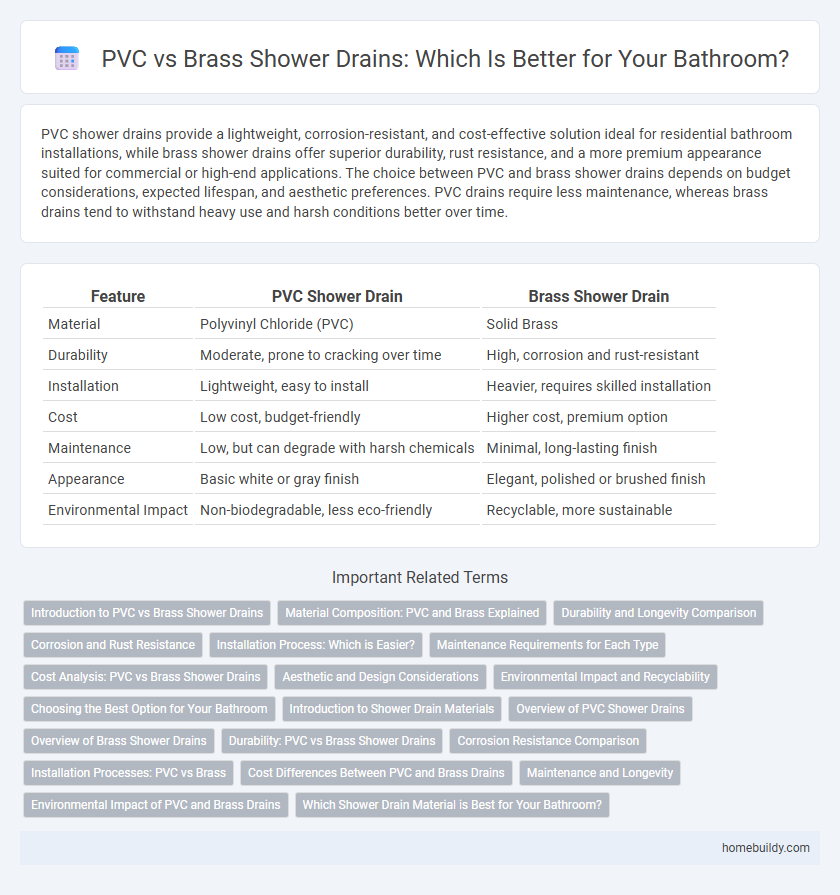PVC shower drains provide a lightweight, corrosion-resistant, and cost-effective solution ideal for residential bathroom installations, while brass shower drains offer superior durability, rust resistance, and a more premium appearance suited for commercial or high-end applications. The choice between PVC and brass shower drains depends on budget considerations, expected lifespan, and aesthetic preferences. PVC drains require less maintenance, whereas brass drains tend to withstand heavy use and harsh conditions better over time.
Table of Comparison
| Feature | PVC Shower Drain | Brass Shower Drain |
|---|---|---|
| Material | Polyvinyl Chloride (PVC) | Solid Brass |
| Durability | Moderate, prone to cracking over time | High, corrosion and rust-resistant |
| Installation | Lightweight, easy to install | Heavier, requires skilled installation |
| Cost | Low cost, budget-friendly | Higher cost, premium option |
| Maintenance | Low, but can degrade with harsh chemicals | Minimal, long-lasting finish |
| Appearance | Basic white or gray finish | Elegant, polished or brushed finish |
| Environmental Impact | Non-biodegradable, less eco-friendly | Recyclable, more sustainable |
Introduction to PVC vs Brass Shower Drains
PVC shower drains offer lightweight, corrosion-resistant properties and cost-effective installation ideal for residential bathrooms, while brass shower drains provide superior durability, resistance to high temperatures, and a polished aesthetic preferred for luxury or commercial settings. PVC drains typically feature ease of maintenance and chemical resistance, making them suitable for long-term use without rust or mineral buildup. Brass drains, composed of a metal alloy, deliver enhanced strength and longevity, often favored in environments requiring robust plumbing fixtures.
Material Composition: PVC and Brass Explained
PVC shower drains are made from polyvinyl chloride, a lightweight, corrosion-resistant plastic ideal for cost-effective and easy installation in residential bathrooms. Brass shower drains consist of an alloy primarily composed of copper and zinc, offering superior durability, resistance to rust, and a premium appearance that suits high-end bathrooms. The material composition of each affects factors such as lifespan, maintenance requirements, and compatibility with various plumbing systems.
Durability and Longevity Comparison
PVC shower drains offer excellent corrosion resistance and ease of installation, yet they are more prone to cracking over time under heavy use or extreme temperatures. Brass shower drains exhibit superior durability and longevity, resisting rust and physical damage while maintaining structural integrity for decades. Choosing brass ensures a longer-lasting solution, especially in high-traffic or moisture-intensive environments.
Corrosion and Rust Resistance
PVC shower drains offer superior corrosion and rust resistance due to their plastic composition, making them ideal for wet environments without metal degradation over time. Brass shower drains, while durable and sturdy, can be prone to corrosion and rust if not properly maintained or coated, especially in acidic or hard water conditions. Selecting PVC drains ensures long-term performance and minimal maintenance related to corrosion issues in shower installations.
Installation Process: Which is Easier?
PVC shower drains offer a simpler installation process due to their lightweight design and compatibility with standard solvent cement, allowing quick bonding without specialized tools. Brass shower drains require careful handling and typically need soldering or threaded connections, which can extend installation time and complexity. For DIY projects, PVC drains are generally easier and more accessible to install compared to the more durable but demanding brass options.
Maintenance Requirements for Each Type
PVC shower drains require minimal maintenance due to their resistance to rust and corrosion, making them ideal for long-term durability in wet environments. Brass shower drains need regular cleaning and occasional polishing to prevent tarnish and corrosion, especially in areas with hard water. Frequent inspection of seals and connections is crucial for both types to avoid leaks and ensure optimal drainage performance.
Cost Analysis: PVC vs Brass Shower Drains
PVC shower drains are significantly more cost-effective than brass options, with prices typically ranging from $5 to $20 per unit, compared to brass drains which can cost between $30 and $100. Installation of PVC drains is generally less expensive due to their lightweight nature and ease of handling, reducing labor costs. While brass drains offer greater durability and resistance to corrosion, the upfront savings on PVC make it a preferred choice for budget-conscious bathroom renovations.
Aesthetic and Design Considerations
PVC shower drains offer a sleek, modern appearance with smooth finishes that blend seamlessly into contemporary bathroom designs, while brass shower drains provide a timeless, elegant look with a metallic sheen that enhances traditional and luxury bathroom aesthetics. Brass models often feature intricate detailing and customizable finishes like brushed or polished, elevating the visual appeal and making them a focal point in shower design. PVC drains, being available in various colors and shapes, provide versatility and subtlety, ideal for minimalist or functional styles without drawing attention.
Environmental Impact and Recyclability
PVC shower drains are made from polyvinyl chloride, a plastic derived from non-renewable fossil fuels and often associated with higher environmental pollution during production and disposal due to the release of toxic chemicals. Brass shower drains, composed mainly of copper and zinc, are more environmentally friendly since brass is fully recyclable and can be reused indefinitely without significant quality loss, reducing the need for new raw materials. While PVC is less biodegradable and recycling facilities for it are limited, brass drains contribute to a circular economy with their high recyclability and lower environmental footprint over their lifecycle.
Choosing the Best Option for Your Bathroom
PVC shower drains offer corrosion resistance, lightweight installation, and cost-effectiveness, making them ideal for budget-conscious bathroom renovations. Brass shower drains provide superior durability, a sleek aesthetic, and enhanced resistance to bacteria and mold growth, contributing to long-term hygiene and style. Selecting between PVC and brass depends on factors such as budget, desired longevity, and overall bathroom design preferences.
PVC shower drain vs brass shower drain Infographic

 homebuildy.com
homebuildy.com